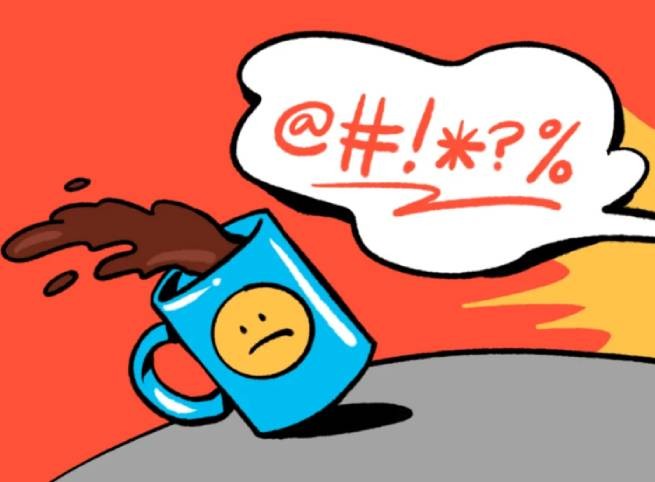Oddly enough, research shows that foul language can be a sign of intelligence. And in the last 20 years, people began to talk about its benefits – after numerous studies of emotions and the brain.
disadvantage or advantage
In society, foul language has always been considered a sign of a lack of education and upbringing, vulgarity and mental “underdevelopment”. However, recent research refutes this. Timothy Jay, professor emeritus of psychology at the Massachusetts College of the Humanities, who has studied foul language for more than forty years, says:
“The benefits of foul language are many. The benefits of swearing have begun to emerge over the past two decades as a result of numerous studies of the brain and emotions, as well as much more advanced technologies for studying the anatomy of the brain.”
Swearing can be a sign of intelligence
In the study, participants were asked to list as many words as they could in a minute that began with F, A, or S. They were then asked to list only swear words that began with those letters. As it turned out, education helped – people with a rich vocabulary were better at inventing swear words than less educated ones. The study found that those who came up with the most F, A, and S words also “produced” the most swear words. Study author Timothy Jay notes that it is a measure of intelligence “to the extent that language correlates with intelligence. People who speak the language well are better at creating swear words.”
He adds also that swearing may be linked to social intelligence:
“Knowing when and where to swear and when not is as much a social skill as choosing the right clothes for the right occasion. It’s a pretty complex social tool.”
sign of sincerity
The scientific study also found a positive relationship between profanity and honesty. People who swore were less likely to lie in interpersonal relationships and generally had higher levels of honesty, according to a series of three studies published in 2017:
“When you honestly express your feelings with strong words, you come across as more sincere.”
Higher levels of profanity were associated with greater honesty, but the study authors warned:
“The results should not be interpreted to mean that the more profanity an individual uses, the less likely they are to engage in more serious unethical or immoral activities.”
Tolerance of pain with “strong words”
Interesting results were obtained during the experiment: cyclists who cursed while pedaling with more resistance had more power than those who used “neutral” words. However, swearing doesn’t just increase stamina: if you pinch your finger while closing a car door, it can be less painful if you don’t hold back and vent your emotions with obscene language.
Another study found that people who cursed while dipping their hand into ice water felt less pain and were able to keep their hands cold longer than those who said a neutral word. Psychologist Richard Stevens, author of three studies, says:
“The main takeaway is that swearing helps with pain management.”
Stevens, who studies swearing at the Psychobiological Research Laboratory at Keele University in Staffordshire, England, explains that swearing triggers the release of adrenaline, which increases heart and breathing rates, preparing the muscles for defense. When this occurs, a biological reaction called analgesia occurs, which makes the body more tolerant of pain. But beware: swear words lose their ability to relieve pain when they are used too often, a study has found.
Swearing of creative natures
The swearing comes from the right hemisphere of the brain, which is often referred to as “creative”. Emma Byrne, author of Mother Is Good for You, says:
“We know that right-sided stroke patients tend to become less emotional, less able to understand and tell jokes, and also tend to stop swearing, even if they used to swear a lot.”
Cursing studies date back to the Victorian era. At that time, doctors discovered that patients who had lost the ability to speak could still swear. Byrne says:
“They swore with incredible fluency. Childhood swear words, swear words, and words with strong emotional content learned at an early age tend to persist in the brain even when the rest of our language is lost.”
Swearing is better than fists
Why do we choose to curse? Perhaps because profanity provides an evolutionary advantage that can protect against physical harm, Jay says:
“A dog or cat will scratch you, bite you when they are scared or angry. Curses allow you to express your feelings symbolically, without having to do it physically. In other words, I can give someone the middle finger or say, “Come on…” across the sidewalk, I don’t have to physically attack them.”
In this way, the researchers note, swearing becomes a form of aggression, offering an opportunity to quickly express one’s feelings while avoiding the consequences. quotes CNN:
“Swearing allows me to express my emotions and at the same time very easily communicates to others about my emotional state. It has the advantage of emotional efficiency – it’s very fast and clear.”







More Stories
Found a wild bear cub "shelter" in the backyard of a residential building
Study: cause of fatal blood clots identified after coronavirus vaccinations with J&J and AstraZeneca vaccines
The world's most popular illusionist was accused of sexual advances by 16 women (video)